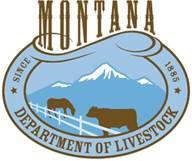Equine Owners Encouraged to Consult with Vets on West Nile Virus Vaccination
 Montana’s animal health officials are encouraging equine owners to consult with their veterinarians about vaccination for West Nile virus after a spike in the number of cases last year. “We had 32 cases last year, the most since 2007, and the third highest total in the nation,” said assistant state veterinarian Dr. Tahnee Szymanski. “That’s concerning because the disease is highly preventable.” Based on MDOL data, no equines that were current on vaccinations have ever contracted the disease in Montana. In contrast, one-third of the non-vaccinated equines that contracted the disease either died or had to be euthanized (161 of 492 since 2002).
Montana’s animal health officials are encouraging equine owners to consult with their veterinarians about vaccination for West Nile virus after a spike in the number of cases last year. “We had 32 cases last year, the most since 2007, and the third highest total in the nation,” said assistant state veterinarian Dr. Tahnee Szymanski. “That’s concerning because the disease is highly preventable.” Based on MDOL data, no equines that were current on vaccinations have ever contracted the disease in Montana. In contrast, one-third of the non-vaccinated equines that contracted the disease either died or had to be euthanized (161 of 492 since 2002).
The best time to vaccinate is before mosquito activity begins, as the vaccine takes a few weeks to offer full protection. Horse owners should consult with their veterinarians to develop a vaccination plan specific to their animal and situation.
Dr. Greg Johnson, professor of veterinary entomology at Montana State University’s Department of Animal & Range Sciences, says vaccination – which is recommended as a core vaccine by the American Association of Equine Practitioners – is prudent given WNV’s unpredictability. “It’s kind of like the flu season,” Johnson said. “We can look at the existing data and forecasts and make some guesses, but we can’t really predict what West Nile is going to do or how bad it’s going to be.” However, with snowpack running at 150 percent of normal throughout much of the state, environmental conditions could be right for WNV activity later this year. “With all of that snowpack, it looks like we’ll have lots of water, and that can mean more mosquitos,” he said. A mosquito-borne disease, WNV was first found on the east coast of the U.S. in 1999. Since then, the disease has spread westward, arriving in Montana in 2002. The disease knows no climactic or geographic boundaries in Montana, and has been found statewide. Stressing the importance of vaccination, Szymanski said, is that there is no treatment for horses that contract the disease.
WNV is a reportable disease in Montana. Any confirmed or suspected case should be immediately reported to the Montana state veterinarian’s office at 406/444-2043.
For additional information, see:
- 2013 West Nile virus map (shows positive cases and known mosquito reservoirs from 2013)
- Centers for Disease Control, West Nile Virus and Horses
- American Association of Equine Practitioners, West Nile Virus
- Contact Montana Department of Livestock


